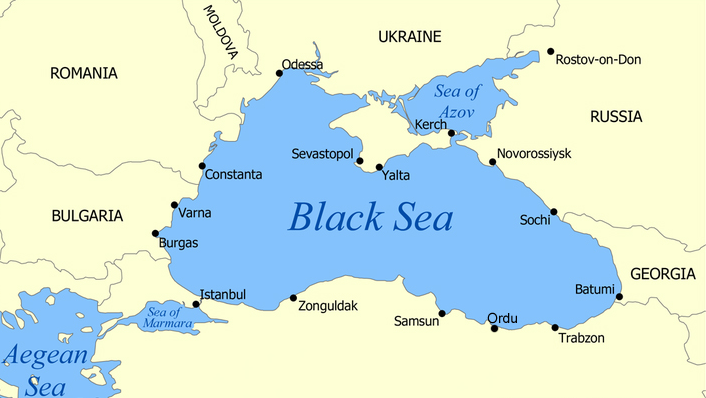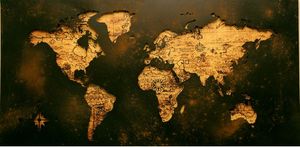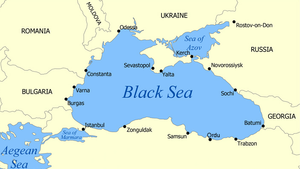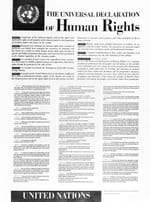[ English version ] [Version en français]
El medio de comunicación Pronews.GR (agencia de noticias) y el periódico Kathimerini habían informado recientemente que Rusia podría estar considerando establecer un consulado en los territorios ocupados por Turquía en el norte de Chipre, ya que después de la invasión de Rusia a Ucrania ha habido especulaciones desde Atenas y Nicosia sobre eso. La embajada rusa en Chipre ha rechazado esto, aunque ha habido cierta inquietud por parte de algunos sectores, consulte este enlace para obtener más información.
To put it succinctly, the current situation puts Turkey more than ever between a rock and a hard place, no matter who you want to be the rock or the hard place, Russia or the NATO framework. But let's give you a minimum necessary framework to understand the situation:
When the Russian Federation annexed Crimea in March 2014 it produced effects on this scenario that we could equate to those triggered by the Treaty of Küçük Kaynarca, signed on 21 July 1774 in Küçük Kaynarca or Dobruja (today, Kaynard Zha in the Bulgarian Silistra) between the Russian Empire and the Ottoman Empire after the latter's defeat in the Russo-Turkish war of 1768-1774. The Ottomans ceded to Russia the region of Yedisan between the Dnieper and Southern Bug rivers, including the port of Kherson, and allowed the Russian Empire direct access to the Black Sea; this element is now finding its perfect replica, as I explained here. The Küçük Kaynarca treaty saw Russia gain the Crimean ports of Kerch and Yeni-Kale (in the Crimea annexed by Russia in 2014, the parallels remain firm and lacerating, not just for Ukraine, but also for Turkey) and the Kabardino-Balkaria region in the North Caucasus district bordered to the north by Stavropol, to the east by North Ossetia-Alania, to the south by Georgia (the 2008 conflict is once again echoing in this region) and to the west by Karachayev-Cherkessia.
The most significant aspect of the treaty for naval history is that it gave Russia access to warm water ports and passage through the Dardanelles. The Ottomans, of course, also lost the Crimean Khanate, which was granted independence, and became effectively dependent on Russia, being annexed to the Russian Empire in 1783 as the Taurid Oblast. The treaty also granted Russia several non-geographical items. In addition, restrictions on Russian access to the Sea of Azov were removed, extending the limitations imposed by the 1739 Treaty of Belgrade by which Russia had obtained territory adjacent to the Sea of Azov, but which prohibited the fortification of the area or the use of the sea for the transport of goods. Similarly, completely closing off control of the Sea of Azov and its Exclusive Economic Zone is another element guiding Russia in this 2022 war.
Russia interpreted the treaty's provisions with Orthodox Christians and their protection as a prerogative to control the principalities of Moldova and Wallachia, casting its shadow over a space into which it now also projects itself through Transnistria, and over which it draws a line from Tiraspol to the Serpent Islet in 2022.
One of the elements that we tend to overlook is that the end of the Cold War, and the accompanying implosion of the Soviet Union and, above all, the Russian financial crisis of the late 1990s had considerably reduced Moscow's influence in the Black Sea and its ability to project force from this sea basin, elements that are coming back with full vigour to the heart of the current conflict and Moscow's real aims, among many others, as I pointed out in this paper.
The fact is that Turkey in the late 1990s had not turned the Black Sea back into a Turkish lake, but Ankara had certainly regained its status as a leading coastal power. To summarise, the reasons can be found in the following elements, which have also defined other strands of Turkey's international relations. Eventually the Refah party, specifically on 25 December 1995, achieved the first victory of Islamism or political Islam in Turkish elections with 21% of the vote, in a context dominated in the MENA region by episodes such as the Islamist insurgency in Chechnya, the civil war in Algeria, the Taliban in Afghanistan. Refah's narrow victory was closely followed by the centre-right ANAP (Anavatan Partisi, the Homeland Party) of the liberal Mesut Yılmaz; and the Straight Path Party (DYP) of the centre-right populist Tansu Çiller, dubbed the "Turkish Iron Lady".
Under pressure from the mainstream media at the time, the army and TÜSİAD, Turkey's main employers' organisation, Yılmaz and Çiller, who shared a common agenda and ideology, struck a government deal that left Erbakan's Refah out. But personal hatreds between Yılmaz and Çiller led the former to leak to Islamists documentation implicating the 'Turkish Iron Lady' and her husband in corruption scandals. Erbakan played the role Yılmaz wanted, and Çiller called Erbakan to offer him the post of prime minister if he would block the investigation against the Çillers. Erbakan accepted and on 28 June 1996 he was head of government after taking the oath of office, abandoning the banner of clean power, which had been the Islamists' rallying cry during the election campaign. In addition, Erdoğan won the Istanbul mayoralty for Refah. Erdoğan's party, the AKP, started out as a mass party that had split from the Islamic Refah in order to seize power and become a party with a "catch-all" ideology in the purest European style, only to mutate into a party with a markedly personalist leadership for the time being.
Erbakan renounced anything that might contradict the Turkish centre-right agenda, leaving Foreign Affairs, Interior, Defence and Education in the hands of the DYP, accepting the wishes of the military leadership at the time to conclude a military cooperation agreement with Israel, or when several officers were expelled for alleged links with Islamic brotherhoods.
However, Erbakan made a mistake. He proposed converting the museum-basilica of Hagia Sophia into a mosque and additionally announced the construction of a huge mosque in Taksim Square, at the time the centre of Istanbul's intense nightlife, but protests forced him to backtrack. In fact, 22 years later, Erdoğan's AKP carried out this project, erecting a mosque in Taksim as part of an urban reform project for the area that involved the construction of a replica of Ottoman military barracks to be used as a shopping mall, exemplifying the very essence of Erdoğanism: a vision of the Ottoman past, right down to the soup, shopping centre exemplifying the prosperous New Turkey and the mega-mosque, which would eventually be the Büyük Çamlıca Cami, Turkey's largest mosque completed in 2016, seating some 63. 000 people, far exceeding Ayasofya, with an art gallery, library and museum inside. And all of this is driven by bricks and mortar and public concession, and defining an urban (and social) revolution in the wake of these activities.
In addition, Erbakan also proposed the abolition of regulations that prevented women from wearing the veil at the university or in the civil service. The Islamists also opened new religious schools, called imam hatip, increasing the number of them by around 20 percent in one year and opening the administration to their militant members.
In foreign policy, Erbakan undertook an anti-imperialist and pan-Islamist discourse, proposing to create and leading the so-called D8, for Developing 8, which was the replica of the G7, which could add developing Muslim countries, taking a firm interest and advancing firmly with Egypt, Iran, Bangladesh, Indonesia, Malaysia, Pakistan and Nigeria to create the D8, Malaysia, Pakistan and Nigeria that would create a common market among them and compete with the EU, with which Turkey, incidentally, had signed a Customs Union agreement in 1995 that entered into force on 31 December, the year it was also recognised as a member of the WTO as of 26 March.
In addition, Erbakan managed to increase relations with Egypt's Muslim Brotherhood, which drew a formal protest from Cairo, and logically with the Palestinian Hamas movement. Relations with Iran and Libya were also increased and intensified.
In short, these lines and the assertion of absolute domination of the waves of the Black Sea meant that the assertion of Russian sovereignty over Crimea and the Russian usurpation with it of the accompanying Exclusive Economic Zone, with the Russians now poised to gain absolute control of the Kerch Strait, the Sea of Azov and the coast of Ukraine as far as the line from Tiraspol to the Serpent Islet (with the accompanying Exclusive Economic Zone of course) has, and we should be aware, changed the landscape.
These developments translated into a May 2014 statement by Russian Defence Minister Sergei Shoigu announcing a massive naval rearmament plan worth nearly $2.5 billion to equip the Black Sea fleet with new air defence systems, warships and submarines by 2020. Russia also deployed the S-400 missile defence system in Crimea, completing the transformation of the peninsula into the epicentre of an A2/AD (an area denial weapon or anti-access/area denial) bubble that has made the Black Sea virtually impenetrable thanks to the Montreux Convention, which prevents a full NATO fleet from entering.
The Black Sea has become a Gordian knot for Ankara, with the pivotal point being to settle its positions between a forced "alliance" with the West and the desire to exhume the foundations of Kemalist geopolitics and thus shift its geopolitical centre of gravity towards Eurasia, This would be one of the factors that could explain the positions adopted by certain Turkish elements and parties in what could be called the Turkish red-jihadist sphere, which has shifted from positions opposed to a more militarily powerful USSR and which placed them in openly pro-US positions, towards positions opposed to the United States and in favour of Russia and China, and this is linked to a certain Kemalist geopolitics, aspects that place Turkey in the position of a minority partner that could be openly vassal if Turkey leaves NATO, with greater autocracy and conditions that are totally close to its own, either on a Kemalist and Eurasianist nationalist path or on a path linked to the political Islam that Iran would represent, but which in both cases would put Turkey completely in the hands of Russia and China, as has happened with Iran's hegemony, and with it, the whole country.
For a little more than the last decade - we could place the timeframe in the Russia-Georgia war of 2008 - Turkey has been fluctuating between NATO and Russia: during the Russo-Georgian war of 2008, the Turks denied access to the Black Sea to two US hospital ships, reinforcing even then the exclusivity of a Turkish-Russian maritime space, but now the advantage of resource exploitation and domination of the Black Sea space puts Turkey as a potential vassal, in a scenario, I insist, similar to that of Iran with Russia and China. After the November 2015 crisis with Moscow, Erdoğan requested and obtained an increased military presence of the Atlantic Alliance in the Black Sea, so that, after the resolution of the crisis with Russia, he would shift the balance towards cooperation with Moscow, and now, after perceiving Russia's intentions, he would activate the Montreux Convention and close the passage of warships from the contending countries through the Turkish Straits.
Putin has been developing a two-pronged strategy with Turkey:
1/ The Turks have to accept that Russia is in a different geopolitical category and can therefore only aspire, at best, to the role of junior partner, and they have also secured political influence, and with other additional factors, depending on the country, throughout the Middle East, playing diplomatic, energy, arms industry and war means cards and balances between the actors, alongside the Chinese, developing their BRI strategy.
2/ Despite its military superiority, Moscow has had no intention of threatening the integrity and existence of the Republic of Turkey. Not as long as Ankara does not threaten Russia's vital and expanding interests under the circumstances. For such reasons, even at the height of the crisis, for example between November 2014 and June 2015 or in 2020, Turkey did not entertain the idea of closing transit through the Turkish Straits to Russian warships bound for Syria, despite having the right to do so under the Montreux Convention. But this has now changed, and it has to do with Russian expansion and its desire for control, although Turkey tries to seek balances and maintain Ukraine's territorial integrity (not only because of the terror of a Kurdistan, but also because all of that Ukrainian territory falls into Russian hands and can exert levers of influence and pressure on Kazakhstan), Azerbaijan and the Turkic space created by Turkey in Central Asia, undermining Turkey's growth, positioning it as a vassal, and gaining China's acquiescence to develop the BRI without hindrance from Turkey, whose only possible alliance is with the West, in an agreed and negotiated manner, if it wishes to have a role other than that of a vassal.
This is why Turkey continues to consider Crimea an integral part of Ukraine, a country with which it has consolidated relations in different aspects from a commercial, military and even cultural point of view. In recent years, Turkish-Ukrainian defence relations have made great strides, including joint projects on satellite technology, long-range missiles and space rockets, drones, and so on. Nor should we forget that the loss of the entire naval fleet after Russia's annexation of Crimea has made Ukraine a potentially very important customer for the Turkish shipping industry within NATO.
So we can conclude that in both a negative and a positive sense - stop the competitor and make it a vassal - Russia (and China, in a supplementary way) has an interest in stopping Turkey. Indeed, certain Turkish media reported on 8 February 2017 that Athens and Moscow signed three agreements on the supply of new missiles for the S-300 defence system. From the Turkish perspective, a possible consolidation of the Russo-Greek axis could only be viewed with suspicion, as it would allow Russia to attack Anatolia from the Black Sea, Syria, Greece and potentially Armenia. In this sense, the 2020 Nagorno-Karabakh conflict with Athens allowed Turkey some breathing space, because it put Greece in NATO and non-Russian positions, and in the process opened up a very interesting path for Turkey to consolidate itself as the third pivot in Asia, with China and Russia, for which it needs the West.
It is in this sense that we are explaining here that the former Turkish prime minister, Ahmet Davutoğlu, between late November 2015 and early April 2016, made a series of foreign visits that outlined a crescent within the Russian sphere of influence: Cyprus, Azerbaijan, Bulgaria, Serbia, Kazakhstan, Ukraine, Finland, with the context of Russia working on consolidating Black Sea hegemony with the annexation of Crimea, as the second step in a series of strategic elements, which would have started in Georgia 2008 and continues in 2022 (and will continue until it achieves its goals, in this region and others).
Turkey is aware that in the long run, the shift of the geopolitical axis towards Eurasia and Africa will bring it gigantic benefits, but after the short-term game with Putin, and which can now be seen in the receipt of Russian money, Erdoğan now no longer needs to forge a friendly relationship with Russia, he needs the US and European partners, including the UK, to generate a Eurasian and African strategy in which he can position himself to offset Russia and China and not find himself as Iran is ending up (in this regard, I highly recommend reading this piece of analysis).
And this is where we come to Cyprus. With the exception that we must reserve for the Turkish Straits, for Turkey no geographical location is of comparable importance to Cyprus, being equidistant from Europe, Asia and Africa and located more or less halfway between the Turkish Straits and the Suez Canal, which divide, or unite, Europe, Asia and Africa. Moreover, there are the British privileges on the island and in the wider region, to which we cannot leave out France. To this must be added the projection from Cyprus towards Anatolia, the Middle East and the fact that it is one of the pillars of the strategic balance in the Eastern Mediterranean, the Balkans and Africa.
In addition to Cypriot and Greek gas, and the projection of the colossus that is Africa, Anatolia would also be the ideal platform for bringing Israeli gas to Europe, something that we have been following closely, since Israel-Greece-Cyprus... and Turkey need each other. The construction of the undersea pipeline to carry the gas from the Leviathan field to the Turkish port of Mersin is key, although this pipeline must necessarily pass through Cyprus's Exclusive Economic Zone, which requires the authorisation of the Nicosia government and therefore some form of solution to the Cyprus crisis, and also of the UK and France, along with Italy and, of course, the United States.
Russia is aware of this, and of the use of Cyprus' golden passports (along with the financial infrastructure). With some interesting changes in Bulgaria, another country that has been issuing such passports, the fact is that Cyprus has played a role that Andrés Mourenza analyses perfectly well in the following link:
El 24/02, mientas los ucranianos corrían a resguardarse de las bombas rusas, en los despachos de #Chipre se negociaba cómo librar al 3er banco del país de las sanciones contra #Rusia.
— Andrés Mourenza (@Andresmourenza) April 16, 2022
Así es cómo un país de la UE se convirtió en la caja fuerte de Moscú 👇 https://t.co/JKE9ju5siS
To which I would add this article published in The Print, entitled "Cyprus, 'haven for Russian money laundering', supports excluding Russia from SWIFT banking".
But there is more to it than that, for as we can guess, Russia has a great interest in the so-called "energy" region of Ukraine (with its Exclusive Economic Zone), Iraq, Iran, Azerbaijan, Kazakhstan, the Anatolian peninsula, Syria, Lebanon, Israel, Egypt, Algeria, the heart of the Sahel? Indeed, Russia is looking after the interests of its elites and is dedicated to at least condition, block if possible, any architecture that would eliminate its privilege to control the European Union, in a strategy where China's Industrial Revolution 4.0 finds the means to subjugate, bind... and convert them into vassals, and at the same time open more fronts for the United States, which cannot continue to confront the Europeans in any aspect, nor vice versa, if it wants to reduce the advantages that China has for the Industrial Revolution 4.0, and where Russia wants to use its different military-diplomatic tools to achieve the great pact that history has repeatedly denied it with the United States and Europe based on energy and weapons.
Ultimately, one cannot overlook the role of Russia, which after the military intervention in Syria in September 2015 has risen to the rank of the first power in the Eastern Mediterranean, and now, acting in combination with China, they are sharing their respective spheres, as in Iran. After the collapse of the Soviet Union, Cyprus became the main capital destination for Russian oligarchs. According to Moody's estimates, in 2013 Russians had more than 31 billion dollars deposited in Cypriot banks, a figure much higher than the island's GDP: for more information you can consult, for example, this link; I also recommend this article from El País, and this other article from the same newspaper on the latest update of the Pandora Papers; or this other article from The Moscow Times; or this other article from the euobserver. The Greek Cypriot government opened its air and naval bases to Russian planes and warships involved in the Syrian war in 2015. So here we have a balancing weight for certain Russian decisions, and even more so if we take into account that perhaps access to certain services of tax havens located in other orbits may become more complicated for the Russians, which could lead to the creation of a larger and deeper network of tax havens in the sphere of countries aligned with Russia and China, as a way to compete with those located in Western spheres.
Turkey is forced to maintain a certain balance in the short term also because, apart from the Caucasus, it happens to be the region's economy most exposed to Russia's, after Cyprus. But with a caveat: its dependence on Russia affects much more the real economy, even the most basic food security if we add Ukraine, than financial services, which are more closely linked to Cyprus, and Turkey does not have access to the European funds that Nicosia does.... Perhaps the European Union should make aid conditional, in food security and in other aspects, if it wishes to compete with Russia, along with other partners, in this region... but we return to what we have already pointed out many times: the euro cannot continue like this, nor can the European Union, unless there is federalism, and a monetary union, but also a fiscal and banking union. This is the real reason why Turkey has announced that it will welcome with open arms Russian money fleeing Western sanctions, favouring the purchase of houses by wealthy Russians seeking Turkish passports, since amounts of between $250,000 and $400,000 are required to obtain a Turkish passport.
From this we can conclude that Russia (and China) will move in the direction of trying to instrumentalise Turkey as much as possible for its own purposes and that Turkey is approaching the limit of cooperation with Moscow in the short to medium term. Turkey's decisions, for the time being, can be understood as follows: the US State Department has written to Congress to support Ankara's request for 40 F-16 fighters and 80 modernisation kits, the UK has lifted its embargo on the export of military equipment to Turkey, which will allow the shipment of engines used in the production of the Turkish TFX fighter; and, according to the Turkish foreign ministry, talks with Canada to lift the embargo on the transfer of military equipment - which has prevented the sale of optical systems used in the dreaded Bayraktar TB2 drones - are moving in the right direction. So its position on Ukraine and the risks involved and the consequences of that conflict are aligned with the Euro-Atlantic axis really.
Entonces, en estas circunstancias, Rusia puede asestarle golpes a Turquía en Asia Central (Kazajstán, como efectivamente lo ha hecho), Medio Oriente (frenando la gran conexión con Europa en términos energéticos), el mismo caso que con África y Europa. Las posiciones de Chipre son delicadas y pasan por una negociación multiparte como el gran conector que es, y que está dentro de la Unión Europea, pero la presión sobre la cuestión rusa se sentirá, por no hablar de la sombra rusa permanente sobre todo el escenario que obligar a una redefinición de las estrategias de la Unión Europea, Canadá, Reino Unido y Estados Unidos, además de Turquía e Israel, por supuesto.
Este es también el conflicto, y será el futuro del conflicto actual.





